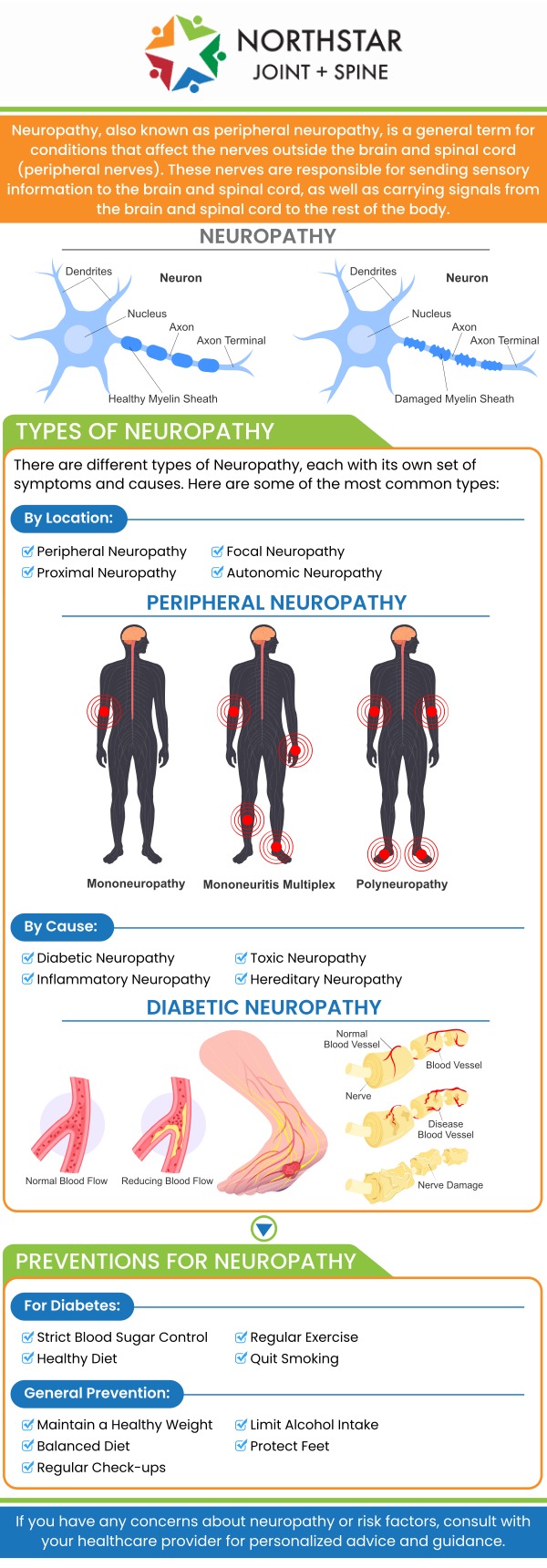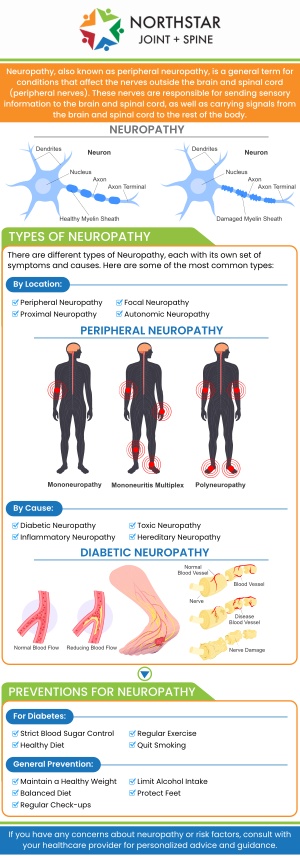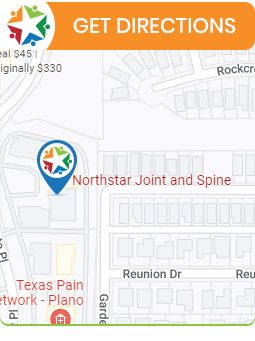Neuropathy Relief Treatment in Plano, TX
Neuropathy relief is possible with targeted, personalized care that addresses nerve pain and dysfunction. Board-certified Dr. Robert J. Nocerini, MD, specializes in advanced treatments designed to restore nerve health and improve quality of life. At Northstar Joint and Spine, patients receive compassionate support tailored to their unique needs. For more information, contact us today or schedule an appointment online now! We are conveniently located at 7704 San Jacinto Pl Suite #200 Plano, TX 75024.


Table of Contents:
What is peripheral neuropathy in Plano TX?
Can peripheral nerves heal?
How much treatment will the nerves require to heal?
Who can develop neuropathy?
Peripheral neuropathy in Plano, TX, refers to nerve damage affecting the peripheral nervous system, which includes nerves outside the brain and spinal cord. This condition commonly causes symptoms like pain, numbness, tingling, and weakness, mainly in the hands and feet.
⦁ Common Causes: Diabetes is the leading cause in Plano and nationwide. Other causes include autoimmune diseases, infections, and exposure to toxins.
⦁ Symptoms: Patients may experience burning sensations, sharp or shooting pain, loss of sensation, muscle weakness, and difficulties with balance and coordination.
⦁ Diagnosis: Early diagnosis through physical exams, nerve conduction studies, and blood tests is crucial for effective management.
⦁ Treatment Options: Treatment at Plano clinics like Northstar Joint and Spine focuses on addressing the underlying cause, relieving symptoms, and improving nerve function using medications, physical therapy, and specialized protocols.
⦁ Importance of Early Care: Prompt treatment can prevent worsening nerve damage and improve quality of life. Patients in Plano are encouraged to seek evaluation at the first signs of neuropathy.
Yes, peripheral nerves have the ability to heal and regenerate, as supported by extensive scientific research. However, successful healing depends on identifying and addressing the root cause of the nerve damage. Without stopping the underlying factors that cause neuropathy, nerve recovery is limited. Providing proper care and support to the affected nerves enhances their capacity to repair and restore function.
To effectively promote nerve healing, several key factors must be evaluated:
⦁ What is causing the nerve damage?
⦁ How extensive and severe is the damage?
⦁ Which types of nerve fibers are involved—sensory nerves (including both small and large fibers) or motor nerves responsible for muscle movement?
It’s important to note that if muscle weakness from neuropathy has persisted for over two years, muscle damage may become irreversible. Early diagnosis and intervention are critical for optimal nerve recovery.
The amount of treatment needed depends on the extent of nerve damage and which types of nerve fibers are affected.
Our treatment approach focuses on four key objectives:
⦁ Creating an optimal internal environment to support nerve regeneration
⦁ Enhancing blood circulation to damaged nerves
⦁ Stimulating affected nerves—whether small sensory fibers, large-diameter fibers, or motor nerves—to reduce pain and improve balance
⦁ Reducing pain signals processed by the brain
Our exclusive therapy increases blood flow to nerves in the hands and feet, promoting natural nerve rejuvenation. Many patients have experienced significant improvement without surgery or reliance on addictive medications.
At our clinic, we provide a safe, non-invasive, and non-surgical protocol combining cutting-edge therapies to effectively address neuropathy symptoms. Before starting treatment, you’ll undergo a thorough diagnostic evaluation to determine your suitability for the program.
This detailed assessment equips you with all the information needed to make an informed decision, ensuring confidence in the potential success of your neuropathy care plan.
Neuropathy can affect people of all ages and backgrounds, but certain groups are more at risk due to underlying health conditions or lifestyle factors.
⦁ Diabetes Patients: Diabetes is the most common cause of neuropathy, affecting a significant portion of those with poorly controlled blood sugar levels.
⦁ Individuals with Autoimmune Diseases: Conditions like lupus and rheumatoid arthritis can lead to nerve damage through inflammation.
⦁ People Exposed to Toxins: Long-term exposure to heavy metals, alcohol abuse, and certain medications increases neuropathy risk.
⦁ Those with Infections: Viral infections such as HIV, hepatitis, and Lyme disease can cause neuropathic symptoms.
⦁ People with Nutritional Deficiencies: Lack of essential vitamins, especially B vitamins, can impair nerve health.
⦁ Elderly Individuals: Age-related wear and tear can contribute to nerve degeneration.
Early diagnosis and management are crucial for all at-risk individuals to prevent progression and improve quality of life. For more information, contact us today or schedule an appointment online now! We are conveniently located at 7704 San Jacinto Pl Suite #200 Plano, TX 75024. We serve patients from Plano TX, Willow Bend TX, Frisco TX, Allen TX, Addison TX, North Dallas TX, and surrounding areas.

Check Out Our 5 Star Reviews


Additional Services You May Need
▸ Back Pain
▸ Shoulder Pain
▸ Chronic Pain
▸ Epidural Steroid Injections
▸ Spinal Cord Stimulation
▸ Viscosupplementation
▸ Genicular Nerve Blocks
▸ Facet Injections
▸ Joint Injections
▸ Sacroiliac Joint Injections
▸ Lumbar and Cervical
▸ Facet Medial Branch Blocks
▸ Diagnostic Nerve Blocks
▸ Medication Management
▸ Neck Pain Doctor
▸ Diabetic Peripheral Neuropathy
▸ Headaches
▸ Suboxone
▸ Botox for Migraines
▸ Peripheral Nerve Stimulation
▸ Spine
▸ Joints
▸ Muscles
▸ Bones

Additional Services You May Need
▸ Back Pain
▸ Shoulder Pain
▸ Chronic Pain
▸ Epidural Steroid Injections
▸ Spinal Cord Stimulation
▸ Viscosupplementation
▸ Genicular Nerve Blocks
▸ Facet Injections
▸ Joint Injections
▸ Sacroiliac Joint Injections
▸ Lumbar and Cervical
▸ Facet Medial Branch Blocks
▸ Diagnostic Nerve Blocks
▸ Medication Management
▸ Neck Pain Doctor
▸ Diabetic Peripheral Neuropathy
▸ Headaches
▸ Suboxone
▸ Botox for Migraines
▸ Peripheral Nerve Stimulation
▸ Spine
▸ Joints
▸ Muscles
▸ Bones






